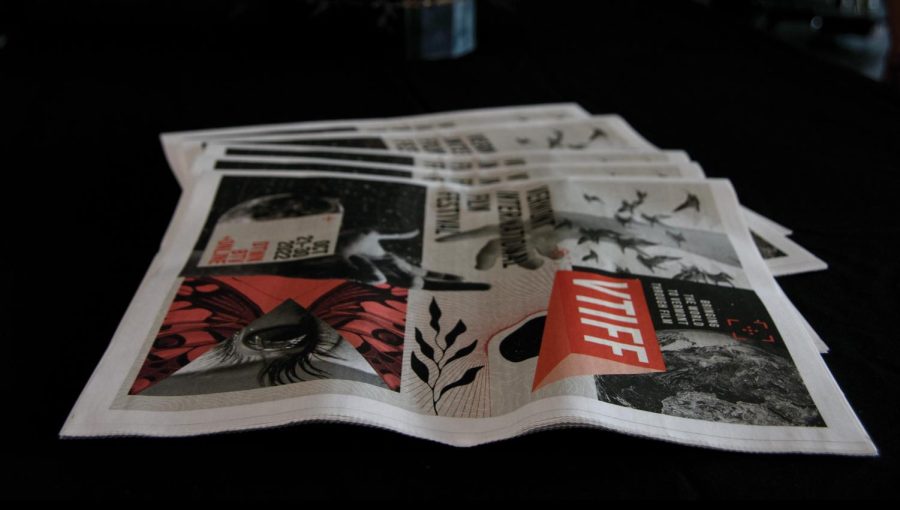Film industry revamping, Vermont International Film Festival bigger than ever
The Vermont International Film Festival showcased 64 films from Oct. 21-30. The festival is held at Main Street Landing Performing Arts Center in Burlington.
November 2, 2022
For 10 days out of the year, filmmakers and cinema enthusiasts alike experience life in Serbia, France, Egypt and Italy without having to leave Burlington’s lakeside community.
The Vermont International Film Foundation hosted its 37th annual Vermont International Film Festival, showcasing 64 activist-oriented films from Oct. 21-30 at Burlington’s Main Street Landing Performing Arts Center, a satellite venue at the Savoy Theater in Montpelier, and through virtual screenings online.
Founded by George and Sonia Cullinen in the anti-nuclear movement of 1985, The Vermont International Film Foundation has expanded from its roots in environmentalism and human rights to embrace a wider variety of global social issues, according to the VTIFF website.
The foundation hosts monthly screenings and three annual film festivals, of which VTIFF is the oldest.
The Global Roots Film Festival revolves around an annual theme, and the Made Here Film Festival exclusively hosts submissions originating from Northern New England and Quebec.
Orly Yadin, the foundation’s executive director, discussed her uncertainty as the festival officially shed COVID-19-era restrictions.
“It’s our first return as a full-fledged festival after COVID,” she said. “We had no idea how many people would come, but so far it’s proven to be [a success].”
Due to the delays caused by the pandemic, this year’s festival hosted more films than in years past, Yadin said.
“Films that were supposed to be released in 2020 and 2021 were put on hold, because all the theaters were shuttered,” she said. “Plus we’re showing new ones from 2022.”
As a curated event, VTIFF only shows films that have been selected by its programming committee, Yadin said.
“It’s very important to us to be diverse geographically, in types of filmmakers, whether it’s women or people of color, and in terms of style and topic of the film,” Yadin said. “But the first criterion is they have to be really good.”
The quality of the film is judged by its ability to stimulate an emotional and intellectual response, Yadin said.
“The ideal is the audience comes out having been open to ways of thinking that they haven’t thought before, or wanting to learn more,” Yadin said.
Charles Burnett, an American filmmaker, was a guest speaker at this year’s festival and was awarded the VTIFF Award for Outstanding Contribution to American Cinema.
Burnett attended the screenings of two of his films, “To Sleep with Anger,” which covers a mysterious drifter’s visit to old acquaintances, and “Killer of Sheep,” which follows a sleep-deprived slaughterhouse worker as he struggles to fulfill his family’s financial and emotional needs.
The Library of Congress added “Killer of Sheep,” Burnett’s master’s thesis project, to the National Film Registry in 1990, which is an official recognition of a film’s enduring significance in American culture, according to a March 25, 2007 New York Times article.
In a Q&A session following the film’s 7 p.m. screening Wednesday, Oct. 26, Burnett credited international film festivals with validating him as a young filmmaker in the 1970s.
“In Europe, [‘Killer of Sheep’] did very well in the festivals,” he said. “People started talking about film as an art, and it wasn’t talked about like that here [in America],” Burnett said.
Pure cinematic appreciation is enough to drive non-filmmaking locals to the festival, including senior Julia Lewis, a VTIFF intern.
“I love movies, so I thought it would be a cool experience to be part of the production of a film festival,” Lewis said.
Working within VTIFF’s impassioned community has deepened Lewis’ appreciation of Burlington’s arts scene, she said.
“The festival is not just an event or service, but it’s something that people support, and it means a lot to them,” she said. “They look forward to it all year.”
Junior Benton Sherman saw six films at the festival this year and already plans to return next year, he said.
“The only movie that really hit me hard was ‘Decision to Leave’ just because it was a very crazy story,” Sherman said. “It was a cop-crime drama, mixed with a forbidden love story. I’d never seen anything like it.”
The festival allowed Sherman to see films he otherwise wouldn’t have known existed, he said.
“I don’t think they’re even playing in theaters, and I haven’t seen any marketing for these movies in the U.S.,” he said. “It opened my eyes to movies that I probably wouldn’t have seen that are really, really good.”
The unique cinematography displayed at the festival provoked Sherman’s own cinematic creativity, he said.
“It has given me a couple ideas for different shots that I could use in film projects for class,” Sherman said.
In an increasingly streaming-based industry, VTIFF provides cinephiles the rare opportunity to find a sense of belonging in a dark theater and open their minds to global perspectives as they sit back and enjoy the show.







